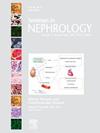Infection-Related Glomerulonephritis in Children and Adults
IF 2.8
3区 医学
Q2 UROLOGY & NEPHROLOGY
引用次数: 0
Abstract
Infection-related glomerulonephritis is an immunologically mediated glomerular injury after an infection. Glomerulonephritis may occur with the infection or after a variable latent period. Poststreptococcal glomerulonephritis (PSGN) is the prototype of infection-related glomerulonephritis. The streptococcal antigens, nephritis-associated plasmin-like receptor and streptococcal exotoxin B, have emerged as major players in the pathogenesis of PSGN. Although PSGN is the most common infection-related glomerulonephritis in children, in adults, glomerulonephritis is secondary to bacteria such as staphylococci, viruses such as hepatitis C, and human immunodeficiency virus, and, rarely, parasitic infections. Supportive therapy is the mainstay of treatment in most infection-related glomerulonephritis. Treatment of the underlying infection with specific antibiotics and antiviral medications is indicated in some infections. Parasitic infections, although rare, may be associated with significant morbidity. Poststreptococcal glomerulonephritis is a self-limiting condition with a good prognosis. However, bacterial, viral, and parasitic infections may be associated with significant morbidity and long-term consequences. Epidemiologic studies are required to assess the global burden of infection-related glomerulonephritis. A better understanding of the pathogenesis of infection-related glomerulonephritis may unravel more treatment options and preventive strategies.
儿童和成人与感染相关的肾小球肾炎。
感染相关性肾小球肾炎是感染后免疫介导的肾小球损伤。肾小球肾炎可能在感染时发生,也可能在不同的潜伏期后发生。链球菌感染后肾小球肾炎(PSGN)是感染相关性肾小球肾炎的原型。链球菌抗原、肾炎相关浆蛋白样受体和链球菌外毒素 B 已成为 PSGN 发病机制中的主要角色。虽然 PSGN 是儿童中最常见的感染性肾小球肾炎,但在成人中,肾小球肾炎是继发于葡萄球菌等细菌、丙型肝炎和人类免疫缺陷病毒等病毒以及极少数寄生虫感染。支持疗法是大多数感染性肾小球肾炎的主要治疗方法。在某些感染情况下,可使用特异性抗生素和抗病毒药物治疗潜在感染。寄生虫感染虽然罕见,但可能会导致严重的发病。链球菌感染后肾小球肾炎是一种自限性疾病,预后良好。然而,细菌、病毒和寄生虫感染可能会导致严重的发病率和长期后果。需要进行流行病学研究,以评估与感染相关的肾小球肾炎的全球负担。更好地了解与感染相关的肾小球肾炎的发病机理,可能会发现更多的治疗方案和预防策略。
本文章由计算机程序翻译,如有差异,请以英文原文为准。
求助全文
约1分钟内获得全文
求助全文
来源期刊

Seminars in nephrology
医学-泌尿学与肾脏学
CiteScore
5.60
自引率
0.00%
发文量
27
审稿时长
6-12 weeks
期刊介绍:
Seminars in Nephrology is a timely source for the publication of new concepts and research findings relevant to the clinical practice of nephrology. Each issue is an organized compendium of practical information that serves as a lasting reference for nephrologists, internists and physicians in training.
 求助内容:
求助内容: 应助结果提醒方式:
应助结果提醒方式:


